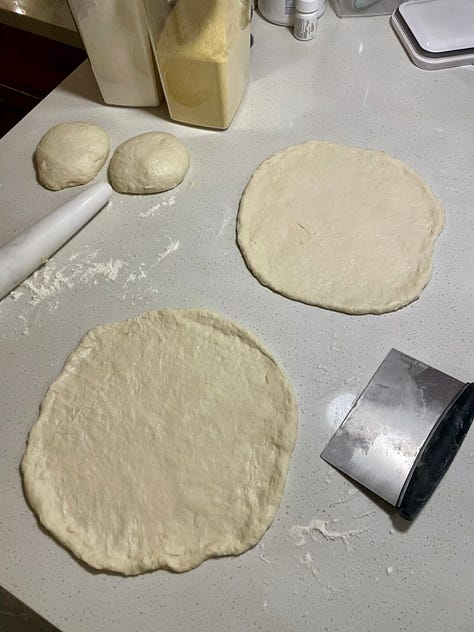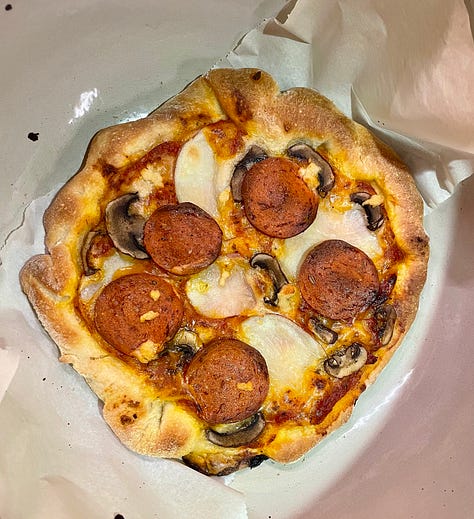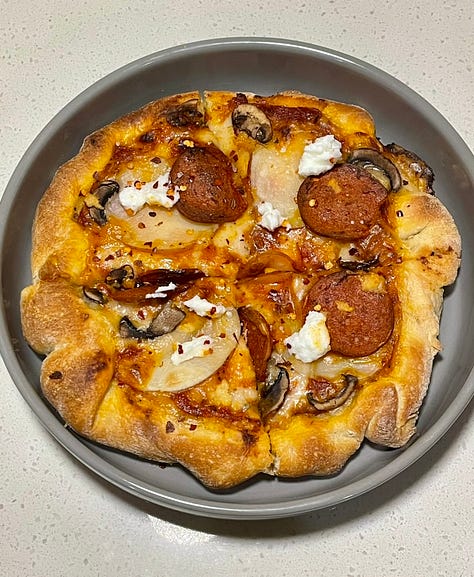Food News: Something Must Be Done About Florida (and Factory Farms)
The farm-fresh newsletter, not to be confused with a free-range or cage-free newsletter.
hi hi,
The smell of sourdough pizza dough is wafting into my office as I’m writing to you from a sliver of sun that graces my desk for 15 minutes in the late afternoon, on rare days when the San Francisco fog takes time off. And here I thought midwest winters humbled me and my LA upbringing.



This is my second summer in the city and I am very glad this basement apartment comes with central heat that is so generously paid by my landlord with my rent money. It’s quite a juxtaposition for me to crawl under an electric blanket in California in August after reading about all of the places experiencing the record-breaking heat side of our climate crisis.
I may have an extremely high cost of living and go days at a time without seeing sun, but SF life does have some perks—I got to take Ginny to Outsidelands! Ok technically we were walking by Golden Gate Park and conveniently ended up near the stage where Chappell Roan was performing right at the time her set started. I could see the top of the stage and with Ginny’s ears I’m sure it sounded like we were right in front of the stage. Fun fact, Ginny is also a Midwest Princess!
Ok today’s newsletter is a chunky one, see you on the other side! <3
-k
What I’ve Read
Kroger wins dismissal of 'farm fresh' egg lawsuit - According to U.S. District Judge Charles Kocoras, reasonable Kroger consumers would not think that eggs in a carton labeled as “farm fresh” means that those eggs come from hens that roam around on farms that look like, well, the farms that all the pastoral marketing on food products and in food advertisements show us. Apparently, the average consumer would reasonably understand that “farm fresh” isn’t a descriptor of the environment the eggs come from. It’s totally different from “cage-free,” “free-range,” and “pasture-raised” labeling. Everyone—except the plaintiff in this case—knows that “farm fresh” only applies to the timing and origin of the eggs. Oh, except for the 646 Kroger customers surveyed who thought “farm fresh” did mean cage-free.
Curious to know what chicken egg labeling descriptors mean? Check out this Humane Society resource.Democratic VP Pick Tim Walz Has Long Centered Food Policy - Diet Mountain Dew loyalist, Tim Walz, has a record of supporting “progressive” food policy in his gubernatorial career. I put progressive in quotes because establishing a universal free school breakfast and lunch program and supporting food system-based climate solutions should be standard, common policy. Unfortunately, we know it isn’t. Only 9 states in this supposedly great nation offer universal free school meals and other forms of food assistance programs are underfunded, complex to access, and highly stigmatized. Hopefully Walz will bring “progressive” food policy to the White House!
Now seems like a great time for a friendly reminder for my fellow Americans to register to vote, check your voter eligibility, or update your voter registration please for the love of god do not let Project 2025 happen. It’s a nightmare for everything, including food and ag policy!
Cultivated meat on a farm? Putting farmers at the centre of a new technology - One of the main arguments against lab-grown or cultivated proteins is that they will take (traditional farm) work away from farmers. This is a hypothetical possibility for when cultivated protein operations become scalable, sometime in the future. The folks who are concerned about hypothetical job loss never seem to be as concerned about animal ag megafarm operations that have been definitively putting smaller farms out of business for decades. Strange.
A couple of European startups are working toward decentralizing cultivated protein production, which would mean smaller quantity operations that could be sustained at a more local, accessible level. The goal is to generate a “ready-to-use production system for food producers” so that farmers can transition to this new technology rather than blame it for taking their jobs.
When I was first learning about cultivated proteins, many years ago, I heard someone describe a decentralized production system that they compared to microbreweries or craft beer culture, which I think is helpful. Microbreweries gained massive popularity in the 2010s so the model should be fairly familiar. Smaller, regional beer producers haven’t put Budweiser, Coors, or Corona out of business but they do offer alternatives. The worst they seem to have done is enable your typical craft beer, IPA-loving white dude to mansplain hops to anyone in earshot. And before you come for me please know I worked for $2.13/hour at a local brewery/tap room in a midwestern college town.Something Must Be Done About the Names of Plant-Based Food Companies - In my decade of paying attention to the vegan food space it’s been interesting to see the evolution of animal-free products and companies, the language and labeling they use, and society’s reactions to their innovations. I’ve noticed a trend of weird names that feel very food-tech-startup-ish and the author of this piece highlights a few of them: Plonts, THIS PKN, Malk, Klimon. In my experience helping develop small plant-based food and bev CPG brands, I’ve yet to be part of any naming discussion that involved removing all vowels or spelling things backward.
Speaking of strange names and labeling of animal-free foods…related news from Chile: New Bill to Define and Label Plant-Based Alternatives as “Simulated Food” - You can read the full press release here (in Spanish or translated into English)
AI Wants to Count Your Calories - Researchers in Canada are developing a way for AI to analyze people’s food intake. Instead of a manual food diary where there is a lot of room for human error this newer technology uses recordings of people eating. This way you’re more accurately capturing what people are consuming rather than what’s on their plate or in the package.
As a total aside to this article, in my second year of grad school, I co-presented an app at a Tufts Nutrition Entrepreneurship competition that essentially offered an alternative to traditional food diary apps centered on weight loss/gain and calorie counting. Our proposed app, Plena, was to offer a highly customized user experience to track health and wellness markers and behaviors and more inclusive default settings to be mindful of disordered eating triggers, among other things. We sought to use AI and ML to more accurately track dietary intake with a photo capture component.
Our main criticism from the judges? The technology was unrealistic and couldn’t be achieved in the near future. This is something we strongly disagreed with then (my co-presenter had the technical expertise), but you can’t exactly argue back with judges in a competition. Well, judges. Some of us look pretty silly, just 5 years later. Side note to this side note—I still think this app is great so hit me up if you want to do this thing! Jk jk…unless…Lawsuit Attacks Florida’s Lab-Grown Meat Ban as Unconstitutional - Florida’s bill making the sale of cultivated meat illegal was signed on May 1st and went into effect on July 1st. This week, Upside Foods and the Institute of Justice filed a lawsuit against the ban arguing that it violates the Supremacy Clause, two provisions in the Federal Meat Inspection Act and Poultry Products Inspection Act, and the Commerce Clause.
Ditching factory farming can help prevent another pandemic - This article discusses how factory farming negatively impacts public health as well as the environmental case for reducing animal-meat consumption and calls for the animal advocacy movement to focus on cross-movement building advocacy for collective progress rather than working to add more vegans to the ranks. It also mentions how a plant-based default behavior architecture strategy has been applied in institutional food settings to successfully reduce animal-meat consumption.
Disney wants a wrongful death lawsuit thrown out because the plaintiff had Disney+ - I won’t pretend to understand the legalese involved or the nuances of contract law, but the gist seems to be that the cause of death for a Dr. Kanokporn Tangsuan was, “a result of anaphylaxis due to elevated levels of dairy and nut in her system.” Dr. Tangsuan was severely allergic to nuts and chose to dine at a restaurant in Florida’s Disney Springs dining complex because it confirmed dishes could be made free from her stated allergens. Dr. Tangsuan’s husband, Jeffrey Piccolo, filed suit against the restaurant and Walt Disney Parks and Resorts U.S. Inc. Disney’s response was to request the case go to arbitration rather than a trial. It reasons that Piccolo had previously signed up for a Disney+ free trial, which had a user agreement stating, "any dispute between You and Us, Except for Small Claims, is subject to a class action waiver and must be resolved by individual binding arbitration." It also shared that in purchasing a ticket to Disney World you agree to similar terms. Oy.







Yes, very important points, food policy, very interesting...but especially THAT PIZZA LOOKS AMAZING
an update to the Disney lawsuit story: https://apnews.com/article/disney-allergy-death-lawsuit-b66cd07c6be2497bf5f6bce2d1f2e8d1